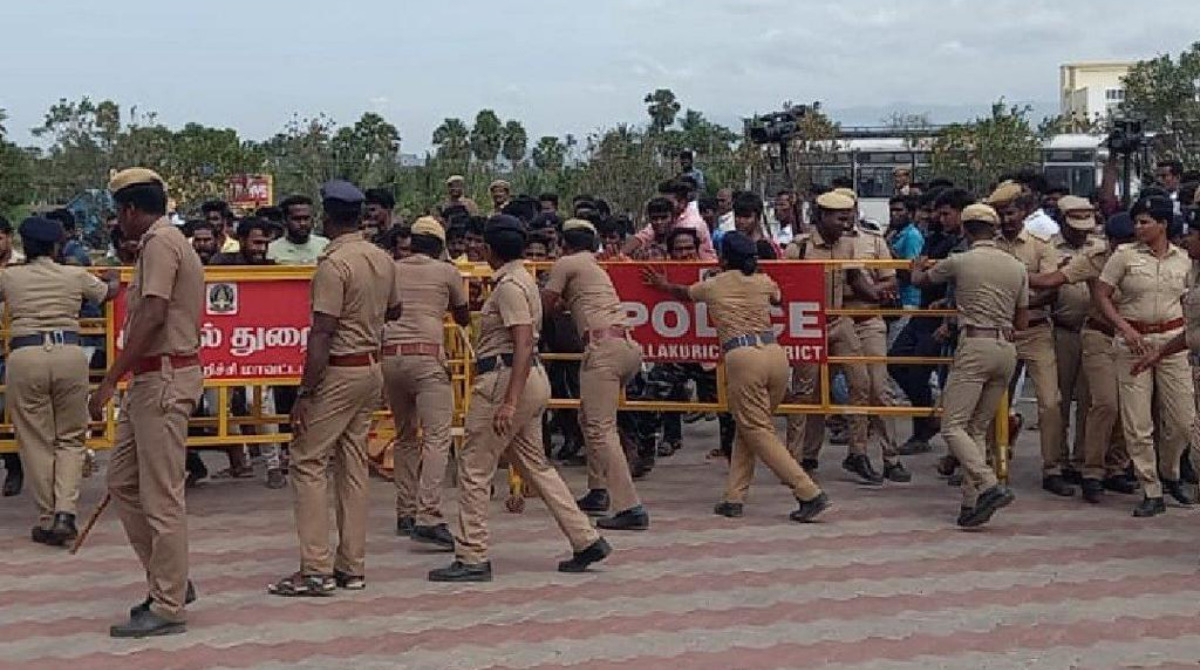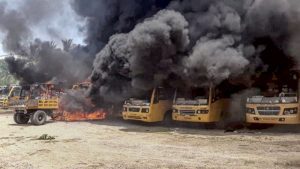Police believe that the social media monitoring teams can prevent caste, religion and political clashes, besides fighting fake news.

Less than two months after the Kallakurichi violence, the Tamil Nadu police have constituted special social media teams to monitor and curb the circulation of fake news (Supplied)
If there is one lesson that Tamil Nadu and its police learnt from the Kallakurichi violence — a protest demanding justice for a Class 12 girl student, who was found dead at a private school in the district on 17 July, that went out of control — it is the power of social media in organising a huge gathering and inciting passions through irresponsible reporting, rumours, and misinformation.
Various kinds of conspiracy theories pushed through social media platforms fuelled the suspicion around the child’s death. A protest that was organised to seek justice for her ended up in violence, with the private school vandalised and miscreants indulging in arson and rioting.
Social media sensationalised the case to the extent that the Madras High Court had to intervene and direct the police department to take stringent action against those carrying out a parallel investigation or trial in cyberspace.
The latest status report that was submitted to the court by the head of the Special Investigative Team probing the 17 July Kallakurichi violence said that a requisition was sent for blocking of content in 63 YouTube links, 31 Twitter links, and 25 Facebook links (including two on Instagram) that were found to be spreading false information or conducting a parallel investigation or trial. Seven WhatsApp groups were also identified through which protestors were “instigated and made to congregate”.

Several buses were burnt by protestors during the violence that broke out at a private school in Kallakurichi on 17 July (Supplied)
Less than two months after the Kallakurichi incident, the Tamil Nadu police have constituted special social media teams to monitor and curb the circulation of fake news and misinformation.
Though the initial announcement for the same was made by Tamil Nadu Finance Minister Palanivel Thiaga Rajan in the state budget that was presented this year in March, Director General of Police (DGP) C Sylendra Babu issued an official note on 5 September, informing that social media teams have been formed in nine cities, including Chennai, and 37 districts with 203 personnel.
The main aim of the monitoring teams would be to nip in the bud false information on social media and remove the posts under question. The accounts of those spreading such information would be disabled, and they would also be booked under cybercrime cases.
Importantly, the police department believes that the social media monitoring teams, through their actions, would be able to prevent caste, religious, and political clashes.
The press note from the DGP said that it was essential now to keep a close eye on people who circulate rumours and misinformation on social media platforms such as YouTube, Twitter, etc., thereby creating confusion, unrest, and violence, and bringing disrepute to the police force.
Likewise, he added that it was imperative to monitor and detect the perpetrators of sexual offences, sale of drugs, and financial frauds in cyberspace.
Officials with expertise in computer handling and cyber-forensics have been selected to work in the social media teams, which would be headed by the superintendent of police (SP) in the cybercrime wing.
Though the police department claims that the idea behind the social media monitoring teams is to crack down on fake news and misinformation, the opposition parties in the state feel that it would be misused by the government to silence its critics.
Kovai Sathyan, spokesperson of the AIADMK, alleged that the DMK has been targeting the IT wing functionaries of the party ever since it formed the government.
“The DMK government has been going after our IT wing functionaries from the time they came to power. The harassment will become more now with the formation of the social media monitoring teams. Our legal wing has been directed to extend all possible support to our IT wing members,” he told South First.
Sathyan also claimed that the police department is acting like the “puppet of the DMK government”.
“The police don’t go by the rule of law. They go by the command given by their master MK Stalin,” he added.
The BJP, too, has expressed similar views on the matter.
Reacting to the decision of the police department to form the special teams, BL Santosh, national general secretary of the BJP, took to Twitter and termed it the “next level of intimidation” after “bullying by DMK leaders failed to silence the nationalist voices”. This was retweeted by Tamil Nadu BJP chief K Annamalai.
200 strong …. Team @BJP4TamilNadu gaining ground with each day … Here comes next level of intimidation after bullying by @arivalayam leaders fails to silence the nationalist voices . Over to next round . pic.twitter.com/t15Jh5iNFk
— B L Santhosh (@blsanthosh) September 5, 2022
While agreeing that there was nothing wrong in the police department monitoring social media activities, Narayanan Thirupathy, vice president of the Tamil Nadu BJP, told South First that the DMK government has been indulging in “vendetta politics” since it came to power.
“They don’t take any action when it comes to abusive posts against Prime Minister (Narendra) Modi, other BJP leaders, or even Hindu Gods. But action is immediately taken if the DMK is criticised, or the CM. The social media teams would only give more strength to the DMK government to target the opposition,” he claimed.
Rubbishing the claim that the state government is targeting its political rivals, DMK MLA and the party’s IT wing chief TRB Rajaa told South First that the DMK’s is the “most liberal government” in terms of freedom of speech and expression.
“Despite all the garbage and personal attacks made against Chief Minister Stalin, and even some of the officers in the government, we have not taken any serious action against those who are publishing these posts,” he said.
“The DMK government stands for democratic rule, and the chief minister is very clear that freedom of expression must be protected at all costs.”
Rajaa accused the BJP of playing “big games with the support of a full North India-based machinery” on social media to pump out fake news.
However, not all fake news is political, he said.
“There are several fake news items and misinformation related to religion, and these could trigger communal tensions. Likewise, there are other subjects that could mislead people,” the ruling party’s IT wing chief said.
Citing other examples to highlight the need for social media monitoring teams, he said: “Take the suicide of a 17-year-old girl student in Thanjavur district. The issue was blown up on social media. It was alleged that she took the extreme step because she was being asked to convert to Christianity by her school authorities. But the truth about the case seems to be different than what was portrayed on social media. The Kallakurichi violence is similar. All this needs to be pre-empted and police need to make sure that things don’t become problematic.”
Iyan Karthikeyan, editor-in chief of Youturn — a website based out of Tamil Nadu that tackles fake news — told South First that it was a “necessity” to monitor social media platforms.
As far as fake news in Tamil Nadu is concerned, he said, the recent trend is to portray that “Hindus are under attack” and that the “DMK government is being anti-Hindu”.
“For example, some people try to push stories that claim the DMK government has demolished several temples. In reality, it may have been done based on a court order. But there is an attempt to show that the DMK government is deliberately acting against Hindus. They even use unrelated or old videos of temple demolition,” Karthikeyan explained.
Posts targeting minorities are another point of concern. “There is a lot of hatred that is being instigated and it needs to be addressed,” he pointed out.
However, even as Karthikeyan bats for necessary monitoring against fake news and misinformation, he believes that it could also pose a threat to freedom of expression.
“The monitoring should not be one-sided. It shouldn’t be the case that the police only focus on those people who criticise the government,” he said.
While highlighting how certain serial fake news peddlers do not face any action, Karthikeyan expressed concern about how only those who don’t have any major political/religious backing are arrested or face action for their questionable posts.
Elaborating on his point, Karthikeyan claimed: “The Indu Makkal Katchi Twitter handle posts fake news on a daily basis. They post stuff without verifying it or they manipulate or distort the content. Many of the posts are communal in nature. So why haven’t the police taken action against it yet? Prominent persons with such political or religious backing are not touched.”
As far as social media users and influencers are concerned, the move of the police department to constitute the monitoring teams have drawn mixed reactions.
For instance, Felix Gerald, editor-in-chief of Redpix, a popular Tamil YouTube channel with 2.14 million subscribers, told South First that the approach of the police department is “highly dangerous”.
Explaining his viewpoint, he said: “While I understand the need to crack down on fake news, the way in which it is going is as though the media should report only what the state wants. It can be used as an intimidation tool by the government.”
It may be noted that the Crime Branch-Criminal Investigation Department (CB-CID), which is probing the death of the Class 12 student in Kallakurichi, had warned of legal action against those media outlets, including social media accounts, who carry out a “parallel investigation” into the child’s death and publish reports with their own interpretation of her death.
On the other hand, Senthil Vel, another social media influencer with 3,12,000 subscribers on YouTube, deemed the move “necessary” in this day and age.
“There is an information war that is going on. The public won’t be able to distinguish between correct news and fake news,” he said while speaking to South First on why the initiative assumes significance.
He also cited a few instances that he believed warranted a move like the formation of social media special teams.
“During the Chennai floods, a BJP member tweeted a video from Gujarat claiming it to be from Chennai. Despite others pointing it out, he never deleted it. Take another example, that of the Kallakurichi case. What will happen if religious/caste clashes are organised in the state the way violence broke out in Kallakurichi? All this aside, there are also organised and planned abuse of individuals, harassment of women on social media platforms, etc., which needs to be kept under check,” Senthil Vel elaborated.
While expressing concern that the social media monitoring teams must not be used to target those who are criticising the government, he added that the initiative did not pose a threat to freedom of speech and expression.
Elaborating, Senthil Vel said: “For example, if during my show I say something like ‘why hasn’t the DMK government provided ₹1,000 as monthly assistance for women heads of family as promised by the party ahead of elections’, can they arrest me for saying that or register a case? Even if they do, do you think something like that will withstand judicial scrutiny? But if someone dishes out conspiracy theories about the helicopter crash that killed late Chief of Defence Staff Bipin Rawat in Nilgiris district, it warrants action. Similarly, if someone says they will go around and demolish all Periyar statues or vandalise temples, it is not freedom of speech. It is an offence.”

Jul 26, 2024

Jul 26, 2024

Jul 26, 2024

Jul 25, 2024

Jul 21, 2024

Jul 21, 2024